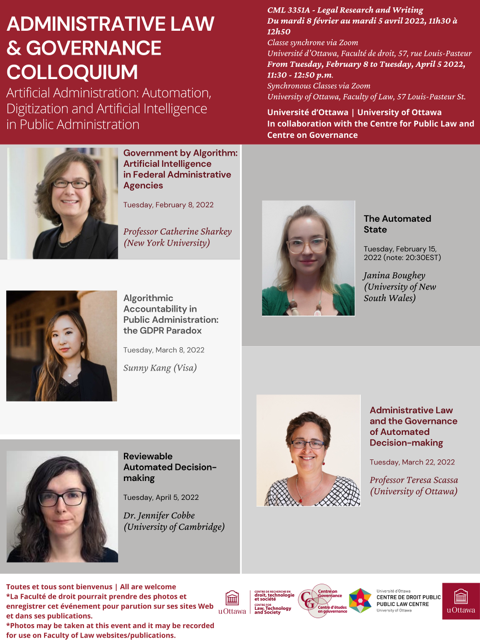Administrative Law & Governance Colloquium 2022 (Artificial Administration): Some Reading

This year’s Administrative Law & Governance Colloquium kicks off next week with Professor Catherine Sharkey of New York University. The Colloquium will be virtual and, of course, free of charge. You can register here.
Professor Sharkey will be discussing the report she co-authored for the Administrative Conference of the United States on artificial intelligence in US federal agencies: Government by Algorithm.
Here is the schedule for this year’s Colloquium:
Tuesday, February 8, 2021: 11.30 to 12.50 EST
Catherine Sharkey (NYU), Government by Algorithm: Artificial Intelligence in Federal Administrative Agencies
Tuesday, February 15, 2021: 20.30 EST to 22.00 EST
Janina Boughey (UNSW), The Automated State
Tuesday, March 8, 2021: 11.30 to 12.50 EST
Sunny Kang (Eightfold AI), Algorithmic Accountability in Public Administration: the GDPR Paradox
Tuesday, March 22, 2021: 11.30 to 12.50 EST
Teresa Scassa (Ottawa), Administrative Law and the Governance of Automated Decision-making
Tuesday, April 5, 2021: 11.30 to 12.50 EST
Jennifer Cobbe (Cambridge), Reviewable Automated Decision-making
As in previous years, I have collected some materials which might be of interest for attendees at the Colloquium:
- Andrew Le Sueur, “Robot Government: Automated Decision-Making and its Implications for Parliament” in Alexander Horne and Andrew Le Sueur eds., Parliament: Legislation and Accountability (Hart Publishing, Oxford, 2016).
- Cary Coglianese and David Lehr, “Regulating by Robot: Administrative Decision Making in the Machine-Learning Era” (2017) 105 Georgetown Law Journal 1147.
- Cass Sunstein, “Algorithms, Correcting Biases” (2019) 86 Social Research 499.
- Catherine Sharkey, “AI for Retrospective Review” (2021).
- Celine Castets-Renard, “Comparing European and Canadian AI Regulation” (Law Commission of Ontario, Toronto, 2021).
- danah boyd and Kate Crawford, “Critical Questions for Big Data: Provocations for a Cultural, Technological, and Scholarly Phenomenon” (2012) 15 Information, Communication & Society 662.
- Digital Disruption White Paper Series, Responsible Artificial Intelligence in the Government of Canada, version 2.0 (April 10, 2018).
- Frank Pasquale and Danielle Citron, “The Scored Society: Due Process for Automated Predictions” (2014) 89 Washington Law Review 1.
- Jenna Burrell, “How the Machine ‘Thinks’: Understanding Opacity in Machine Learning Algorithms” (2016) (January to June) Big Data & Society 1.
- John Danaher, “The Threat of Algocracy: Reality, Resistance and Accommodation” (2016) 29 Philosophy & Technology 245.
- Karen Yeung, “Algorithmic Regulation: A Critical Interrogation” (2018) 12 Regulation & Governance 505.
- Law Commission of Ontario, Regulating AI: Critical Issues and Choices (Toronto: April 2021).
- Mireille Hildebrandt, “Law as Computation in the Era of Artificial Legal Intelligence: Speaking Law to the Power of Statistics” (2018) 68 University of Toronto Law Journal 12.
- Monika Zalnieriute, Lyria Bennett Moses and George Williams, “The Rule of Law and Automation of Government Decision-Making” (2019) 82 Modern Law Review 425.
- Pedro Domingos, “A Few Useful Things to Know about Machine Learning” (2012) 55(1) Communications of the ACM 78.
- Taylor Owen, “The Violence of Algorithms” in Taylor Owen, Disruptive Power: The Crisis of the State in the Digital Age (Oxford University Press, Oxford, 2015).
- The Citizen Lab, Bots at the Gate: A Human Rights Analysis of Automated Decision-Making in Canada’s Immigration and Refugee System (Toronto, University of Toronto, 2018).
Again, register here.
Here is the description of this year’s Colloquium:
In the era of Big Data, governments and public entities are turning more and more to automation, digitization and machine learning to operate more effectively and efficiently. The extent of technological change in and on public administration is difficult to quantify, but concern has grown about the use of cutting-edge algorithms and forms of artificial intelligence to support governmental operations. There have been high-profile examples of maladministration causing interference with privacy interests or the unlawful withdrawal of benefits. States have responded by developing regulatory frameworks, such as the General Data Protection Regulation in the European Union and the Directive on Automated Decision-Making in Canada. Are these frameworks sufficiently robust to cabin automated decision-making, digitization and use of machine learning? Do we need new accountability mechanisms to deal with rapid technological evolution in the machinery of government? And what role for judicial review, as the rise of a “culture of justification” in administrative law and the expansion of the “duty of fairness” impose strict requirements of justification, intelligibility and transparency which machines might not be able to meet? Speakers from Australia, Canada, the United Kingdom and the United States will reflect on these questions and others during the 2022 Colloquium.
This content has been updated on April 13, 2022 at 22:44.